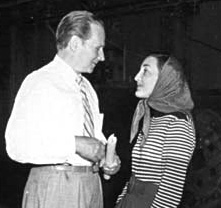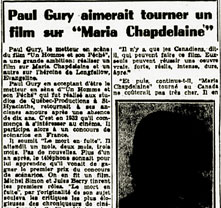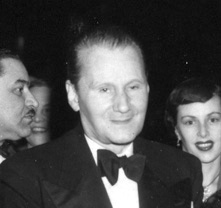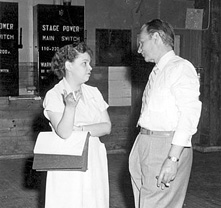Paul Gury (1888-1974)
-

Paul Gury on the set of the film Le curé de village (1949).
Source : Cinémathèque québécoise, 1998.2006.PH.2237
-

Le Canada, 2 February 1949, p.16
Source : Bibliothèque et Archives nationale du Québec
-

Paul Gury (centre) and Nicole Germain (right) attending the premiere of Séraphin (Paul Gury, 1950)
Source : Cinémathèque québécoise, 1998.2008.PH.0941
-

Paul Gury on the set of a film.
Source : Cinémathèque québécoise, 2000.0164.PH.03
An Actor and Author
Louis-Marie (“Loïc”) La Gouriadec, born in Bretagne, arrived in Quebec at the age of nineteen. While living off odd jobs, Paul Gury, as he now called himself, took theatre courses. He was noticed by Paul Cazeneuve of the Théâtre National, who hired him as an actor. Gury became director of the theatre in 1918, where he remained until he was replaced by Rose Ouellette (La Poune) in 1936.
Gury began to write his own plays from an early date. His work Le mortel baiser was performed in several countries. From 1936 to 1938, he acted in film and theatre in France. In the course of his travels, he also learned scriptwriting. Because of his reputation, he was sought out by radio producers, for whom he produced both short sketches and radio serials.
A Successful Filmmaker
After the Second World War, his experience naturally drew him to directing films in Quebec. Paul L’Anglais hired him to help Claude-Henri Grignon adapt his novel Un homme et son péché and then asked him to direct the film. It was released on 29 January 1949 and was a great success. Gury also directed the sequel, Séraphin, with practically the same cast and crew. It was released a year later, and between the two Gury directed Le Curé du village, adapted by Robert Choquette from his own popular radio serial. It was a success as well. In less than a year, Guty had directed three films which had found favour with the public.
Return to the Stage
After marrying Yvette Brind’Amour, in 1949 Gury helped found the Théâtre du Rideau Vert, a theatre company which would soon specialise in the production of Quebec plays. He then continued his prolific career as a director, actor, scriptwriter and author on stage and in television.